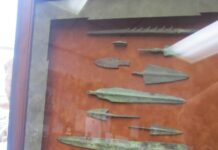“I am more concerned with the elegance of the theory than the truth of it.”
(Anonymous Scientist)

What does the great and spacious building represent? (The pride of the world.) In what ways have you been made fun of because you were trying to do right? Who influences people who make fun of us? Why are those in the building pointing a mocking finger at those not in the building? Would you rather have common sense or Intellect? Since the spacious building refers to pride, let’s discuss pride. Remember Pres Benson’s landmark talk on Pride? I review some of it below. Here is the complete talk.
“Unfortunately, some are among us who claim to be Church members but are somewhat like the scoffers in Lehi’s vision – standing aloof and seemingly inclined to hold in derision the faithful who choose to accept Church authorities as God’s special witnesses of the gospel and his agents in directing the affairs of the Church.” (Harold B. Lee, Conference Report, Apr. 1971, p. 91 as taken from Latter-day Commentary on the Book of Mormon compiled by K. Douglas Bassett, p.34)
What is the difference between a Scientist and Academia?
“One need not look far into science to discover it consists too generally of a maze of facts and theory so closely interwoven that even the most learned and honorable scientist (to say nothing of the intellectually dishonest one or the novice) may have difficulty in distinguishing readily between truth and theory.” — Joseph Fielding Smith Man, His Origin and Destiny
“Unfortunately, owing to the strong desire of scientists to display their brilliance and ingenuity, there is a tendency for theory to become the objective instead of a means to the end. Theory then not only loses its real value, but actually becomes a stumbling block to progress. Its inventor and disciples become so engrossed in the theory that they lose sight of its fundamental purpose, the quest for truth. This condition was shockingly illustrated in my presence at a meeting of scientists when one of great renown met a factual objection with the statement, “I am more concerned with the elegance of the theory than the truth of it.” Melvin Cook in the Intro of: Man, His Origin and Destiny
I Believe more in COMMON SENSE than INTELLIGENCE
Evolution

Climate Change
Einstein’s Theory
BofM Translation
One Hill Cumorah
Cave in Cumorah
BofM Geography
Age of Earth
Age of Dinosaurs
Critical Race Theory

1619 Project
Covid Vaccine
Jan 6th Insurrection
Noah’s Flood
Pre-Adamites
Socialism
Abortion
In our search for truth and with so many possibilities, we need help. I don’t believe the Lord nor His Prophets will tell us many of the answers. above. The Lord wants us to test Moroni’s promise. Our bias divides us and that is what Satan wants. We will never agree on all things, but we can all love one another and agree to disagree. A nice tussle and discussion of ideas is always healthy and fun. For example, I adamantly believe the Book of Mormon main events happened in the Heartland of the United States. You can believe what you want which is fine. Let’s discuss it and then allow each other their own opinion.
Another example is our Sunday worship. All active members believe in keeping the Sabbath Day Holy. However, in some families they feel going to the store and shopping is fine, and others do not. Some feel it is a family day with no friends and only immediate family, and others feel it is fine to visit anyone on Sunday. Who is right? Both. Do you think the Prophet will ever tell us which is correct? No! We need to make non-doctrinal decisions on our own through prayer and fasting. We can also believe the Historians we chose to, based on personal prayer as well.
LDS Teachers Employed in Paganism
 “I attended sessions of meetings for the institute teachers, held in the assembly room on the fourth floor of the Church Office Building. I cannot say that I was very greatly edified. Too much philosophy of a worldly nature does not seem to mix well with the fundamentals of the gospel. In my opinion many of our teachers employed in the church school system have absorbed too much of the paganism of the world, and have accepted too readily the views of uninspired educators without regard for the revealed word of the Lord.
“I attended sessions of meetings for the institute teachers, held in the assembly room on the fourth floor of the Church Office Building. I cannot say that I was very greatly edified. Too much philosophy of a worldly nature does not seem to mix well with the fundamentals of the gospel. In my opinion many of our teachers employed in the church school system have absorbed too much of the paganism of the world, and have accepted too readily the views of uninspired educators without regard for the revealed word of the Lord.
What to do about it I do not know. It is a problem for the Presidency to consider. It is a very apparent fact that we have traveled far and wide in the past 20 years [since his father’s death]. What the future will bring I do not know. But if we drift as far afield from fundamental things in the next 20 years, what will be left of the foundation laid by the Prophet Joseph Smith? It is easy for one who observes to see how the apostasy came about in the Primitive Church of Jesus Christ. Are we not traveling the same road? The more I see of educated men—I mean those who are trained in the doctrines and philosophies now taught in the world, the less regard I have for them. Modern theories which are so popular today just do not harmonize with the gospel as revealed to the prophets, and it would be amusing if it were not a tragedy to see how some of our educated brethren attempt to harmonize the theories of men with the revealed word of the Lord. Thank the Lord, there is still some faith left and some members who still cherish the word of the Lord and accept the prophets. Surely the world is ripening rapidly for the destruction, and Satan has power and dominion over his own. If any are saved surely the Lord must soon come and have power over his Saints and reign in their midst, and execute ‘judgment upon Idumea, or the world.'” (Joseph Fielding Smith, Jr., and John J. Stewart, The Life of Joseph Fielding Smith [Salt Lake City: Deseret Book Co., 1972], 210 – 211.)
amusing if it were not a tragedy to see how some of our educated brethren attempt to harmonize the theories of men with the revealed word of the Lord. Thank the Lord, there is still some faith left and some members who still cherish the word of the Lord and accept the prophets. Surely the world is ripening rapidly for the destruction, and Satan has power and dominion over his own. If any are saved surely the Lord must soon come and have power over his Saints and reign in their midst, and execute ‘judgment upon Idumea, or the world.'” (Joseph Fielding Smith, Jr., and John J. Stewart, The Life of Joseph Fielding Smith [Salt Lake City: Deseret Book Co., 1972], 210 – 211.)
Pride
Three times in the Doctrine and Covenants the Lord uses the phrase “beware of pride,” including a warning to the second elder of the Church, Oliver Cowdery, and to Emma Smith, the wife of the Prophet. (D&C 23:1; see also D&C 25:14; D&C 38:39.)

Pride is a very misunderstood sin, and many are sinning in ignorance. (See Mosiah 3:11; 3 Ne. 6:18.) In the scriptures there is no such thing as righteous pride—it is always considered a sin. Therefore, no matter how the world uses the term, we must understand how God uses the term so we can understand the language of holy writ and profit thereby. (See 2 Ne. 4:15; Mosiah 1:3–7; Alma 5:61.)
Most of us think of pride as self-centeredness, conceit, boastfulness, arrogance, or haughtiness. All of these are elements of the sin, but the heart, or core, is still missing.
The central feature of pride is enmity—enmity toward God and enmity toward our fellowmen. Enmity means “hatred toward, hostility to, or a state of opposition.” It is the power by which Satan wishes to reign over us.
Pride is essentially competitive in nature. We pit our will against God’s. When we direct our pride toward God, it is in the spirit of “my will and not thine be done.” As Paul said, they “seek their own, not the things which are Jesus Christ’s.” (Philip. 2:21.)
Our will in competition to God’s will allows desires, appetites, and passions to go unbridled. (See Alma 38:12; 3 Ne. 12:30.)
The proud cannot accept the authority of God giving direction to their lives. (See Hel. 12:6.) They pit their perceptions of truth against God’s great knowledge, their abilities versus God’s priesthood power, their accomplishments against His mighty works.
Our enmity toward God takes on many labels, such as rebellion, hard-heartedness, stiff-neckedness, unrepentant, puffed up, easily offended, and sign seekers. The proud wish God would agree with them. They aren’t interested in changing their opinions to agree with God’s.

Another major portion of this very prevalent sin of pride is enmity toward our fellowmen. We are tempted daily to elevate ourselves above others and diminish them. (See Hel. 6:17; D&C 58:41.)
The proud make every man their adversary by pitting their intellects, opinions, works, wealth, talents, or any other worldly measuring device against others. In the words of C. S. Lewis: “Pride gets no pleasure out of having something, only out of having more of it than the next man. … It is the comparison that makes you proud: the pleasure of being above the rest. Once the element of competition has gone, pride has gone.” (Mere Christianity, New York: Macmillan, 1952, pp. 109–10.)
In reference to the title of this blog, my summary would say. Science is good and learning is great, searching for truth is very valiant but, when we close our mind to learning new things, or close our mind to new discoveries, we are no longer a Scientist searching for facts, but an Academic who only cares about their new pet theory and pushing it on others until they believe this new pet theory of theirs.
“Historians seem to take great pride in publishing something new, particularly if it illustrates a weakness or mistake of a prominent historical figure. For some reason, historians and novelists seem to savor such things. If it related to a living person, it would come under the heading of gossip. History can be as misleading as gossip and much more difficult—often impossible—to verify. The writer or the teacher who has an exaggerated loyalty to the theory that everything must be told is laying a foundation for his own judgment. He should not complain if one day he himself receives as he has given. Perhaps that is what is contemplated in having one’s sins preached from the housetops.” The Mantle Is Far, Far Greater Than the Intellect Elder Boyd K. Packer
Historians Editing “Saints” Book

First I want to say the Saints Book is very good to read and I like it. The Church has worked hard to put together a great volume to help others understand the history of the church. There are in the church, historians and intellectuals who like to retell history or revise things at times. The Prophet and the 12 have trusted these people to say the correct things and most of the time they do what is right. However, some of these intellects who think they they are doing something noble, they make mistakes. Some are mistakes and some of it may be their pride to look good. In Utah especially are two camps of believers so to speak. One group of good LDS members believes there is a hill Cumorah in New York and one in Mexico. They are called Mesoamericanists. They also believe the final battles of the Nephites were on an unnamed hill in Mexico somewhere. They also believe Joseph translated the plates using a stone in a hat to read from and that Joseph never looked at the plates to translate. There is another group of good active LDS people called Heartlanders, who believe the Heartland of the USA is where the Book of Mormon events happened and there is only one hill Cumorah in NY. They believe the final battles happened at this hill in NY and not in Mexico. They also believe that Joseph only used the Urim and Thummim to translate the Gold Plates. (breastplate with two stones in a silver bow like spectacles)
The Church is neutral on these ideas as they don’t want to do anything except preach the doctrine of the Book of Mormon, which of course is most important. However, understand that the Gospel Topic Essays are written by Historians and later approved by the Church, but that doesn’t mean the book is doctrine, it is men’s opinions of the history and narrative and I believe some historians make errors on purpose at times. We all know the Book of Mormon is true, but we also know the “very elect” will believe a lie and try to deceive us. We urge you to pray about all things for your own personal witness as we know the Prophet and Apostles will not lead us astray, but they also want us to think on our own and study about things. Here are three other blogs I did about the Saints book. Understand it is a great book, but some intellectuals have tried to make subtle points that are not correct. #1 Here #2 Here and #3 Here
The Great and Spacious Building
While in the wilderness, Lehi had a dream about a “great and spacious building”, and a “rod of iron.” The great and spacious building represented the pride of the world, while the rod of iron represented the word of God. Lehi, Sariah, Nephi, and Sam all held to the iron rod, and partook of the fruit which was “exceedingly delicious about all other fruit” representing the love of God.

However, Laman and Lemuel, did not follow the rod, and entered the great and spacious building. Lehi related this dream to his family, and asked Laman and Lemuel to reconsider their ways and follow God. However, even with all the promptings, the two older brothers resisted, and ended up fulfilling the dream, becoming enemies to their brothers.
Also in the wilderness, Lehi found the Liahona, a round ball that functioned similar to a compass. However, it only worked as the family was righteous, directing them where they should travel. When they did not follow God, the Liahona failed to work.
The great and spacious building in Lehi’s dream was identified by the angel as representing “the pride and vain imaginations of the children of men” (1 Nephi 12:18). Lehi’s contemporary Jeremiah speaks of the pride of Jerusalem and her people. The Hebrew word used by Jeremiah means “to be/become high.” The word imaginations may be based upon a Hebrew word also found in Jeremiah which denotes a kind of defiant stubbornness in opposition to God which leads to calamity. Vanity (as in vain) is likely based on a Hebrew word meaning “vapor” and often signifies something that is fleeting, worthless, and does not last. Each of these words shed light on the nature of the great and specious building. https://knowhy.bookofmormoncentral.org/knowhy/what-is-the-significance-of-the-great-and-spacious-building
An interesting article below if you want to know more about Academia and Research.
4 Ways Academia and Industry Differ For Research Scientists
Written by Abha Chalpe, PhD
Scientists… the researchers, discoverers, and curious people who dig deeper until they find what they were looking for and then research why and how it got there. Sounds amazing, doesn’t it?
As the old saying goes, ‘necessity is the mother of invention’. Scientists are therefore the facilitators who realize these necessities and invent what we all need. At least that’s the idea.
And why I got into research. All scientists are groomed in the academic environment, and most of us thrive there while we work towards our masters and doctorates. However, the thriving transforms into suffering when the academic goal of achieving the degree is postponed for an indefinite amount of time. PhDs are overworked, underpaid, and certainly undervalued. That’s when a PhD will start to question their decisions. Why did I get into research? Click on title above for complete article.





